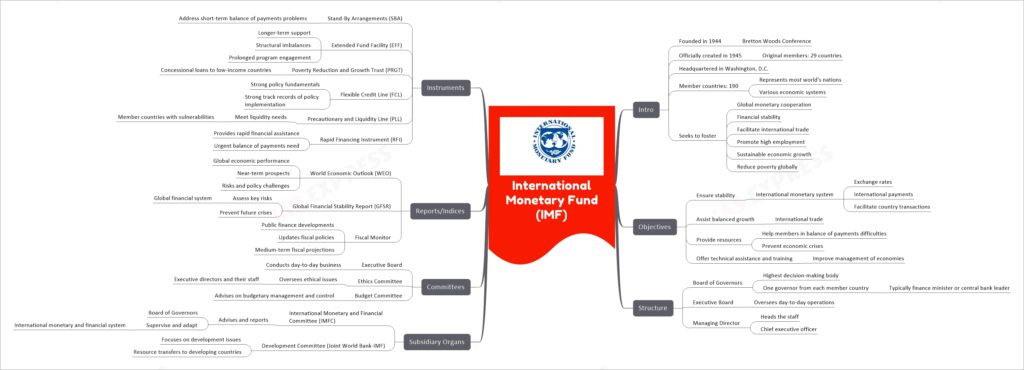International Monetary Fund (IMF): Structure, Instruments, Reports
The International Monetary Fund (IMF) is an international organization founded in 1944 at the Bretton Woods Conference and officially created in 1945 by 29 member countries. The IMF is headquartered in Washington, D.C., and seeks to foster global monetary cooperation, secure financial stability, facilitate international trade, promote high employment and sustainable economic growth, and reduce poverty around the world. The organization now has 190 member countries, representing most of the world’s nations and its various economic systems.
Objectives
The primary objectives of the IMF are to:
- Ensure the stability of the international monetary system—the system of exchange rates and international payments that enables countries and their citizens to transact with each other.
- Assist in the balanced growth of international trade.
- Provide resources to help members in balance of payments difficulties, thereby preventing economic crises.
- Offer technical assistance and training to help countries improve the management of their economies.
This topic of “International Monetary Fund (IMF): Structure, Instruments, Reports” is important from the perspective of the UPSC IAS Examination, which falls under General Studies Portion.
Structure
The IMF’s structure is built around a Board of Governors, which is the highest decision-making body of the IMF, consisting of one governor from each member country, typically the country’s finance minister or central bank leader. Day-to-day operations are overseen by the Executive Board, which is responsible for conducting the business of the IMF. The Managing Director heads the staff of the IMF and serves as its chief executive officer.
Subsidiary Organs
The IMF’s subsidiary organs include several advisory and decision-making committees and departments that specialize in various aspects of its operations, such as:
- International Monetary and Financial Committee (IMFC): Advises and reports to the Board of Governors on supervising the management and adaptation of the international monetary and financial system.
- Development Committee (Joint World Bank-IMF): Focuses on development issues and resource transfers to developing countries.
Committees
Key committees within the IMF include:
- Executive Board: Responsible for conducting the day-to-day business of the IMF.
- Ethics Committee: Oversees ethical issues involving executive directors and their staff.
- Budget Committee: Advises the Executive Board on matters concerning budgetary management and control.
Reports/Indices
The IMF publishes a number of reports and indices that are vital for global economic analysis, including:
- World Economic Outlook (WEO): Provides detailed analysis of global economic performance and near-term prospects, risks, and policy challenges.
- Global Financial Stability Report (GFSR): Assesses key risks facing the global financial system to prevent future crises.
- Fiscal Monitor: Surveys and analyzes the latest public finance developments, updates fiscal implications of policies, and medium-term fiscal projections.
Instruments
The IMF provides support to its members through a variety of financial instruments and mechanisms, including:
- Stand-By Arrangements (SBA): Designed to help countries address short-term balance of payments problems.
- Extended Fund Facility (EFF): Provides longer-term support to countries with structural imbalances that require more prolonged program engagement.
- Poverty Reduction and Growth Trust (PRGT): Offers concessional loans to low-income countries.
- Flexible Credit Line (FCL): For countries with very strong policy fundamentals and track records of policy implementation.
- Precautionary and Liquidity Line (PLL): Designed to meet the liquidity needs of member countries with sound economic fundamentals but with some remaining vulnerabilities.
- Rapid Financing Instrument (RFI): Provides rapid financial assistance to all member countries facing an urgent balance of payments need.
These structures and instruments enable the IMF to play a central role in global economic governance, assisting nations in achieving economic stability and growth.


